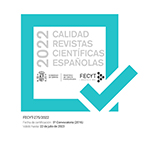Intertextualidad aristotélica entre "A Esmorga" y "Bodas de sangre" en la representación del fatum malus español
Resumen
El presente artículo pretende trazar, en grandes líneas, las similitudes y las diferencias entre una novela de Eduardo Blanco Amor, A Esmorga, y el opus magnum de Federico Garcia Lorca, Bodas de sangre. La perspectiva que empleamos en este estudio será el análisis de la manera en que ambos escritores utilizan los eternos preceptos aristotélicos en la creación de nuevos modelos para la tragedia. Es decir, la manipulación del paradigma aristotélico formulado en la Poética. Para ello, nos centramos también en la relación literaria tan fecunda entre Blanco Amor y Lorca que, según los varios estudios sobre el tema, se refleja en los dos textos que constituyen el objeto de este análisis.
Descargas
Descarga artículo
Licencia
La revista Madrygal. Revista de Estudios Gallegos, para fomentar el intercambio global del conocimiento, facilita el acceso sin restricciones a sus contenidos desde el momento de su publicación en la presente edición electrónica, y por eso es una revista de acceso abierto. Los originales publicados en esta revista son propiedad de la Universidad Complutense de Madrid y es obligatorio citar su procedencia en cualquier reproducción total o parcial. Todos los contenidos se distribuyen bajo una licencia de uso y distribución Creative Commons Reconocimiento 4.0 (CC BY 4.0). Esta circunstancia ha de hacerse constar expresamente de esta forma cuando sea necesario. Puede consultar la versión informativa y el texto legal de la licencia.








